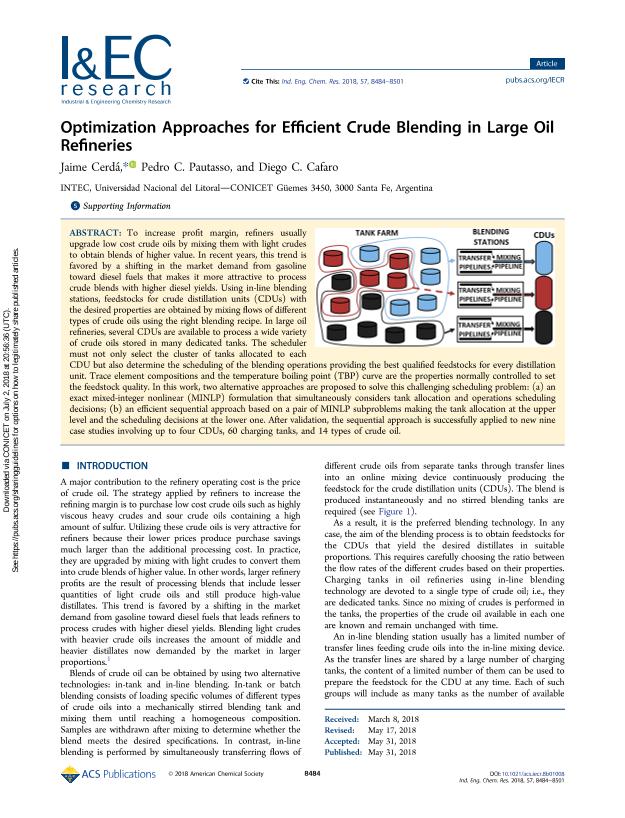Mostrar el registro sencillo del ítem
dc.contributor.author
Cerda, Jaime

dc.contributor.author
Pautasso, Pedro Carlos

dc.contributor.author
Cafaro, Diego Carlos

dc.date.available
2019-10-22T17:11:34Z
dc.date.issued
2018-06
dc.identifier.citation
Cerda, Jaime; Pautasso, Pedro Carlos; Cafaro, Diego Carlos; Optimization Approaches for Efficient Crude Blending in Large Oil Refineries; American Chemical Society; Industrial & Engineering Chemical Research; 57; 25; 6-2018; 8484-8501
dc.identifier.issn
0888-5885
dc.identifier.uri
http://hdl.handle.net/11336/86892
dc.description.abstract
To increase profit margin, refiners usually upgrade low cost crude oils by mixing them with light crudes to obtain blends of higher value. In recent years, this trend is favored by a shifting in the market demand from gasoline toward diesel fuels that makes it more attractive to process crude blends with higher diesel yields. Using in-line blending stations, feedstocks for crude distillation units (CDUs) with the desired properties are obtained by mixing flows of different types of crude oils using the right blending recipe. In large oil refineries, several CDUs are available to process a wide variety of crude oils stored in many dedicated tanks. The scheduler must not only select the cluster of tanks allocated to each CDU but also determine the scheduling of the blending operations providing the best qualified feedstocks for every distillation unit. Trace element compositions and the temperature boiling point (TBP) curve are the properties normally controlled to set the feedstock quality. In this work, two alternative approaches are proposed to solve this challenging scheduling problem: (a) an exact mixed-integer nonlinear (MINLP) formulation that simultaneously considers tank allocation and operations scheduling decisions; (b) an efficient sequential approach based on a pair of MINLP subproblems making the tank allocation at the upper level and the scheduling decisions at the lower one. After validation, the sequential approach is successfully applied to new nine case studies involving up to four CDUs, 60 charging tanks, and 14 types of crude oil.
dc.format
application/pdf
dc.language.iso
eng
dc.publisher
American Chemical Society

dc.rights
info:eu-repo/semantics/openAccess
dc.rights.uri
https://creativecommons.org/licenses/by-nc-sa/2.5/ar/
dc.subject
Crude Oil
dc.subject
Blending
dc.subject
Optimization
dc.subject
TBP Curve
dc.subject.classification
Ingeniería de Procesos Químicos

dc.subject.classification
Ingeniería Química

dc.subject.classification
INGENIERÍAS Y TECNOLOGÍAS

dc.title
Optimization Approaches for Efficient Crude Blending in Large Oil Refineries
dc.type
info:eu-repo/semantics/article
dc.type
info:ar-repo/semantics/artículo
dc.type
info:eu-repo/semantics/publishedVersion
dc.date.updated
2019-10-18T18:06:10Z
dc.journal.volume
57
dc.journal.number
25
dc.journal.pagination
8484-8501
dc.journal.pais
Estados Unidos

dc.description.fil
Fil: Cerda, Jaime. Consejo Nacional de Investigaciones Científicas y Técnicas. Centro Científico Tecnológico Conicet - Santa Fe. Instituto de Desarrollo Tecnológico para la Industria Química. Universidad Nacional del Litoral. Instituto de Desarrollo Tecnológico para la Industria Química; Argentina
dc.description.fil
Fil: Pautasso, Pedro Carlos. Consejo Nacional de Investigaciones Científicas y Técnicas. Centro Científico Tecnológico Conicet - Santa Fe. Instituto de Desarrollo Tecnológico para la Industria Química. Universidad Nacional del Litoral. Instituto de Desarrollo Tecnológico para la Industria Química; Argentina
dc.description.fil
Fil: Cafaro, Diego Carlos. Consejo Nacional de Investigaciones Científicas y Técnicas. Centro Científico Tecnológico Conicet - Santa Fe. Instituto de Desarrollo Tecnológico para la Industria Química. Universidad Nacional del Litoral. Instituto de Desarrollo Tecnológico para la Industria Química; Argentina
dc.journal.title
Industrial & Engineering Chemical Research

dc.relation.alternativeid
info:eu-repo/semantics/altIdentifier/url/https://pubs.acs.org/doi/pdf/10.1021/acs.iecr.8b01008
dc.relation.alternativeid
info:eu-repo/semantics/altIdentifier/doi/http://dx.doi.org/10.1021/acs.iecr.8b01008
Archivos asociados
